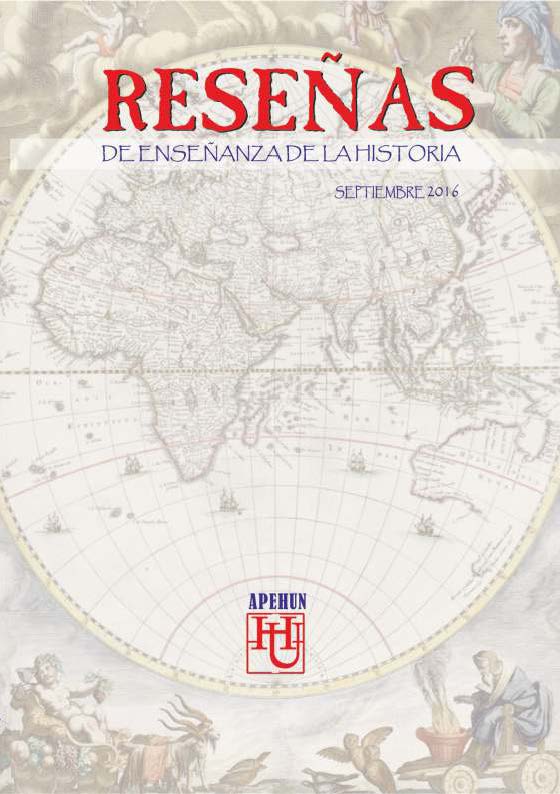La enseñanza de las ciencias sociales y de la historia ante la identidad y la globalización
Keywords:
globalization, migration, school, specific didactics, identities, citizenshipAbstract
One of the challengest that the treatment of school history, historical time or spatial and geographical thinking in contemporary societies consists of overcoming the construction of a school knowledge of reality based on fugacity and immediacy. The school cannot deny its social commitment and its role in a changing world in which the large population movements,the flows of goods,services and capital invite us to “interchange”progressively, thus eliminating physical barriers for consumer goods and capital but not for people. That is why the school has to be sensitive to these burning social issues as the arena where the cultural differences and the identity processes, based on many of the problems that thsthave occurred in the world in the 20and 21century, begin to develop. In our days, the teaching practice cannot ignore, therefore, a challenge like this in democratic societies. In this paper we will discuss the review of the identities that have been based traditionally on the monolithic hegemonic model of the nation state through key concepts such as space, territory and border.
Downloads
References
ABÉCASSIS, Frédéric; BOYER, Gilles; FALAIZE, Benoit; MEYNIER, Gilbert; ZANCARINI-FOURNEL, Michelle (dir.). (2007). La France et l'Algérie: leçons d'histoire. De l'école en situation colonial à l'enseignement du fait colonial. Lyon. Institut National de Recherche Pédagogique
BARTOLOMÉ, Margarita. (2007). Identidad y medios de comunicación: suarticulación educativa en sociedadesmulticulturales. En SORIANO, E. (Coord.), Educación para la convivencia intercultural.Madrid: La Muralla.
BASSANEZI PINSKY, Carla (org.). (2010). Novos temas nasaulas de história. Sâo Paulo: Editora Contexto.
BOLÍVAR, A. (2001). Globalización e identidades: (des)territorialización de la cultura. En Revista de Educación, número extraordinario 2001, pp. 265-288.
BRACEY, Paul; GOVE-HUMPHRIES, Alison; JACKSON, Darius (2011). Teaching diversity in the history classroom. In DAVIES, Ian (ed.). (2011). Debates in History Teaching. London and New York, Routledge, 172-185
CHAFFER, John y TAYLOR, Lawrence. (1975). History and the History Teacher. London: GeorgesAllebn&Unwin.
CELORIO, Juan José. (2014). Educar para la ciudadanía global: retos y desafíos a los paradigmas establecidos. En PASTORIZA ROZAS, José Luis (ed.), Educar para a cidadanía global: experiencias, ferramentas e discursos para o cambio social. Vigo: Fundación Isla Couto, (p. 110-121).
COLL, César y FALSAFI, Leili. (2010). Presentación. Identidad y educación: tendencias y desafíos. En Revista de Educación, 353. Septiembre-Diciembre 2010, pp. 17-27.
CONTRERAS, José. y PÉREZ DE LARA, N. (Comps.). (2013). Investigar la experiencia educativa. Madrid: Morata.
CRUZ, Manuel. (2012). Adiós, historia, adiós. El abandono del pasado en el mundo actual. Ovied:. Ediciones Nobel.
DE LUCAS, Javier. (2015). Mediterráneo: el naufragio de Europa. Valencia: Tirant Humanidades.
FONTANA, Josep. (2005). La construcció de la identitat. Reflexions sobre el passat i sobre el present. Barcelona: Editorial Base.
KAUFMANN, J.C. (2015). Identidades. Una bomba de relojería. Barcelona: Ariel.
HASSANI IDRISSI, Mostafa. (coord.). (2007). Introduction. In Rencontre de l'histoire et rencontre de l'autre. L'enseigment de l'histoire comme dialogue intercultural .Horizons Universitaires RevueScientifique de l'Université Mohamed V-Souissi vol. 3, no 4. Número special, 9-13
MARBEAU, L. (coord.). (1974). Histoir ediachronique et étude des milieux géographiques dans le cycle d'observation des C.E.S. experimentaux ou chargésd'expérience, Paris. INRP.
OLLER, M.; PAGÈS, J. (1999). La historia de los otros. En Historiar, no 3, octubre 1999, pp. 172-187.
PAGÈS, J. (2008). Ensenyar l'actualitat, per a què? En Perspectiva Escolar no 322, febrer, 2-11.
PAGÈS, J. y SANTISTEBAN, A. (coords). (2011). Didáctica del Conocimiento del Medio Social y Cultural en la Educación Primaria. Ciencias Sociales para aprender, pensar y actuar. Madrid: Editorial Síntesis.
RICOEUR, P. (1999). La lectura del tiempo pasado: memoria y olvido. Madrid: Arrecife.
STEARNS, Peter N. (2012). Una nueva historia para un mundo global. Introducción a la “World History”. Barcelona: Crítica
Downloads
Published
How to Cite
Issue
Section
License
Copyright (c) 2022 Reseñas de Enseñanza de la Historia

This work is licensed under a Creative Commons Attribution-NonCommercial-ShareAlike 4.0 International License.
Reseñas de Enseñanza de la Historia distribuye sus contenidos bajo la licencia https://creativecommons.org/licenses/by-nc-nd/4.0
Usted es libre de:
Compartir - copiar y redistribuir el material en cualquier medio o formato.
La licenciante no puede revocar estas libertades en tanto usted siga los términos de la licencia.










